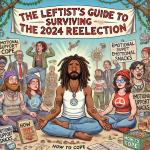 Why do so many evangelical Christians gravitate toward multi-level marketing schemes? Expatriates from the faith know exactly why: because they’ve been training for them their whole lives. The evangelical Christian faith is itself a multi-level marketing scheme, and evangelism is its sales process.
Why do so many evangelical Christians gravitate toward multi-level marketing schemes? Expatriates from the faith know exactly why: because they’ve been training for them their whole lives. The evangelical Christian faith is itself a multi-level marketing scheme, and evangelism is its sales process.
Of course, the stated goal of any MLM is the selling of its products—in this case, salvation—but those at the top of every pyramid know the secret: It’s never about the product itself; it’s always about bringing in a steady flow of new people to keep the enterprise in motion. The products themselves are like the MacGuffin in a movie plot: interchangeable with a thousand other things but still necessary as a focal point to keep the action moving.
In the end it’s the people themselves who are the product, and the more you bring in, the more there will be to bring in others, who can then bring in still more, and so on. The benefits flow upward to the people at the top, perpetuating the need for outreach since the product itself was never really the point anyway. It’s really about the people you bring in. They are the fuel that this engine burns.
But look a little deeper and you’ll see there’s something else that you’re selling: confidence. Or put differently, you’re selling belief—belief that you can trust these people or these products or this process that has made them so successful and happy. You, too, can have all this! And you’ll be so much happier for it if only you believe hard enough.
Belief is so central to human psychology that entire industries, even empires, are built on top of it. On a personal level, it’s the glue that holds together all the collections of stories that make up who we are and how we see ourselves. I would argue that, thanks to the Apostle Paul, no faith or ideology has capitalized on this quirk of human nature better than the Christian faith. But I’m getting ahead of myself.
A Dishonest Species
Human beings are fundamentally narrative creatures—we are story tellers by nature. The very idea of “the self” stems from the collections of internal scripts we accumulate over time, reminding us where we’ve been and where we’re headed. That’s how consciousness forms and develops, building our sense of self by adding layer upon layer of interlocking stories about ourselves and others around us.
We need friends, families, and lovers to stick with us because they help us remember our stories. They support us by helping us sort through the cacophony of competing narratives, and in turn we all contribute to our communities and to the larger world around us by subscribing to the bigger stories that provide the necessary context for all of our smaller stories to make sense.
But stories are selective. Not everything that happens is worth remembering, nor is it all worth retelling. Our brains can only process so much at once, which means we must eliminate an awful lot of unnecessary detail. We have to choose what we remember and what we don’t, which in a way makes us a fundamentally dishonest species—or at least a selectively honest one. There’s no way around it (See: any Christopher Nolan movie).
Maybe this is why it’s so easy to fool humans. We already fool ourselves daily, shutting out the things we don’t want to remember about ourselves because we want to do better. I suppose to some degree we must do that. The only remaining question is: Which parts do we keep and which do we try to delete?
There’s great power in this decision—power that can be used for good or for evil, for constructive purposes or destructive ones. It’s as if each of us has an internal archivist who curates our museum of memories, deciding what stays and what goes. The sheer volume of material they have to work with gives them wide latitude for creating a narrative that makes the most sense and serves the larger goals of the subject (that’s you).
That’s both good news and bad. On the one hand, you can focus on the positive and reward yourself for good behavior by keeping track of it and reminding yourself that this is who you are. On the other, you can also choose to focus on all of your mistakes and failures, gathering them together into a central exhibit in your museum, aiming a harsh spotlight onto the very worst of who you have been. This, too, is who you are.
You are actually both at once. You are all your successes and all your failures blended together, with most of us trying to focus on either the former or the latter. What I’m trying to say is that, in some ways, we really can create our own selves and our own reality—within certain limitations, of course (e.g. viruses exist whether or not you believe in them). That’s true on an individual level, but it’s even more so on a larger scale.
On a larger scale, groups of humans create social constructs—ideas and institutions built entirely upon an agreement that things are what we say they are. At this level, perception really is reality. If you change what enough people think, the whole system changes and reality itself is shaped according to the public will.
In a digital age, those who most effectively wield the power of public perception might as well be gods. To be honest, I’m growing more worried every year as I watch how quickly people believe things they see in their social media feeds, spawning new kinds of faith on an almost weekly basis (see: QAnon). You would think we’d know better given the amount of posturing and preening each of us puts into representing ourselves online. But like I said, we really are good at fooling ourselves.
Which explains why we put such a high premium on confidence. It’s why the cool kids were cool in middle school, and it’s why even in the adult world our leaders are the ones who are the best at acting like they know what they are doing. I’ve often said that certainty is the currency of fundamentalism, but it’s actually true in every human context. A persuasive enough salesman could even talk half a country into putting him in charge despite having zero prior experience in public service. Imagine how destructive that would be.
But that’s the power of belief, and if you learn to use it well enough, there’s almost no limit to what you can do. Belief itself has power to shape our reality, which brings me to the reason why the Christian faith has become one of the most successful religions in history.
Paul’s Brilliant Twist
Religions have always peddled beliefs, of course, but the Apostle Paul took his religious tradition and made it about belief in belief itself. He reframed the story of Abraham, the founding father of his tradition, arguing that it was this man’s belief that made him righteous—not his performance of ritual observation. This innovation opened the door to anyone joining his religion, not just those willing to eat kosher.
After Paul, even the stories about Jesus have him pronouncing this mantra every time he healed someone: “Go. Your faith has made you well.” Did Jesus really say that? Many believe he was little more than a composite literary character in the first place, but who knows? What we do know is that all the surviving representations of Jesus came to us through Paul’s churches, and that explains an awful lot.
You’d think the original twelve disciples would remember if Jesus was always harping on the importance of faith. But to hear Paul talk, they still hadn’t gotten it after nearly 20 years. In Galatians, he tells a story about having to get onto Peter in front of everyone for misunderstanding the most central idea of their new faith. I’m not sure the Jerusalem Crew ever agreed with him theologically, which would explain why every time the original disciples are depicted in the gospels, they are complete and utter morons.
Maybe they really were that dense? I don’t know, but I can tell you that everything we know about them today was brought to us by the communities Paul founded, and he didn’t care much for them or their way of framing things. Better than anyone else before him, Paul understood that belief itself carries the power to determine one’s reality. And belief isn’t beholden to one time or place or ethnicity—it’s universal, available to everyone alike.
Maybe that’s why the Christian faith has endured for so long, even after being reinvented a hundred times over since it began. It’s like a highly adaptable microorganism that can move from place to place and mutate according to what’s demanded at the time.
Plus, believing in belief itself taps into the closest thing to a superpower that humans possess—the ability to shape our reality by controlling perception itself. Successful politicians understand this as do preachers and salesmen alike. Many fortunes have been created and destroyed this way. And it’s why Christians, especially evangelical Christians, make the most natural pyramid scheme material of all time.
[Image Source: Adobe Stock]
__________
If you’re new to Godless In Dixie, be sure to check out The Beginner’s Guide for 200+ links categorized topically on a single page.
And if you like what you read on Godless in Dixie, please consider sponsoring me on Patreon, or else you can give via Paypal to help me keep doing what I’m doing. Every bit helps, and is greatly appreciated.
















